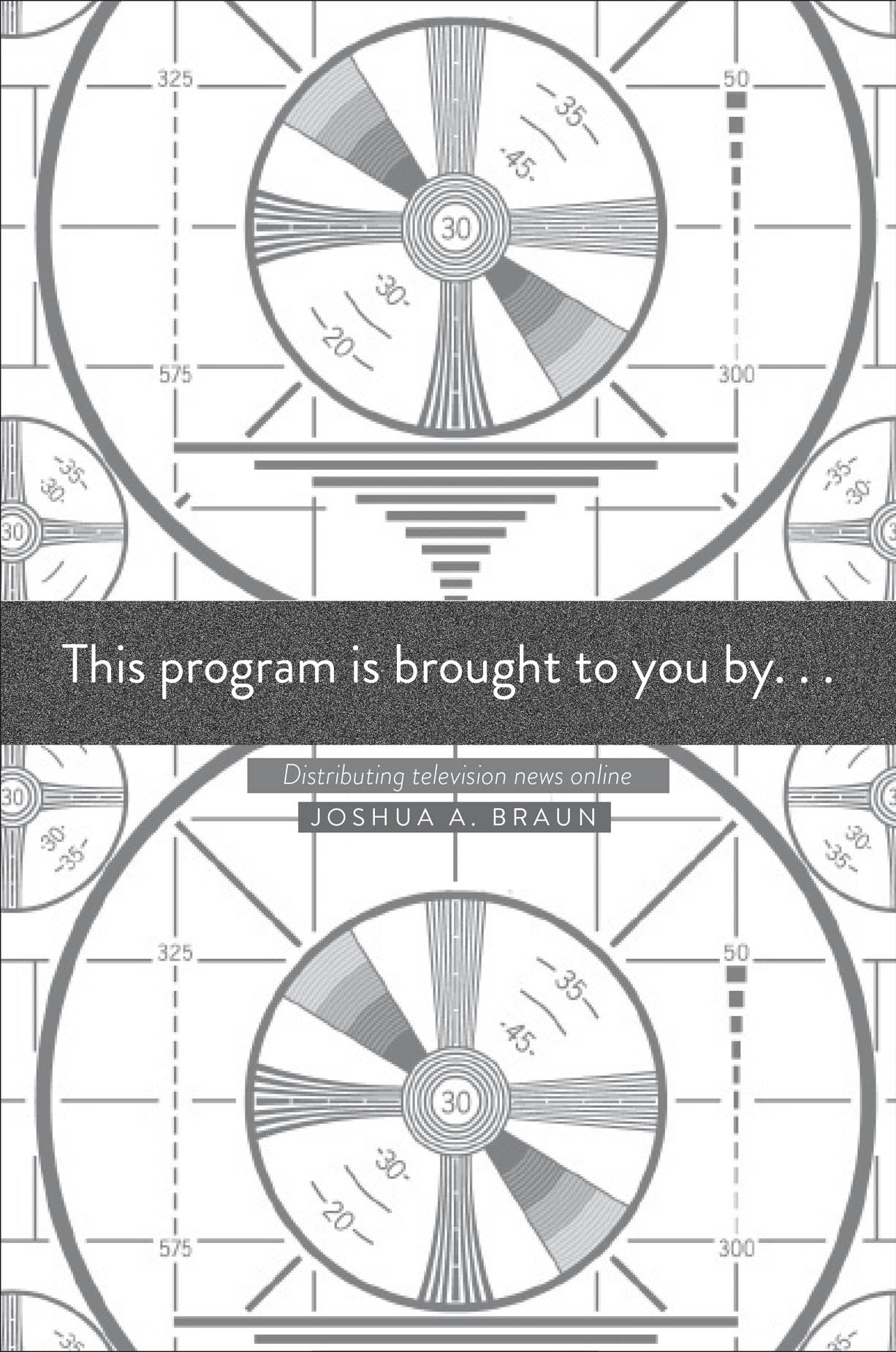Reflections on an $1,800 Dissertation
Josh Braun / UMass Amherst

In 2010 I applied for an external grant to fund the field work for my dissertation. I was rejected. I elected to proceed on a shoestring budget[1] and, eight years on from filing said dissertation, I’ve had the opportunity to reflect on the that experience from different perspectives—first as a Ph.D. candidate, then as a job applicant, a book author,[2] and a faculty member working with grad students.
This seems like a good place to think through what I learned—both from the process of doing dissertation on a tight budget and the contours of inclusion and exclusion that dissertation funding stakes out within the academy. If you find yourself in the same boat I was, here I offer you combination of advice and laments. What I write here will be primarily addressed to folks doing field work in Media Industry Studies, but regardless of your discipline or tradition, feel free to follow, discount, or reject my advice as you see fit. I hope it helps someone down the road.
Rejection
First off, I want to normalize rejection. Advisors and institutions are quick to encourage students to go whaling after big dissertation improvement grants from the NSF or various private foundations. That’s as it should be. You can’t win a sweet award of that sort if you don’t apply. But grants like these are highly competitive and rejection is the most common outcome.
It doesn’t mean your research isn’t worthwhile. It’s entirely possible to get positive reviews across the board and still not get such an award. Quite often the issue is not one of quality, but of fit. There are lots of “penumbral” topics within Media Industry Studies that are essential, but fall at the edges of what the major funding programs are focused on.
Years later, I would find out in conference discussions and email threads among established colleagues that—even for research faculty—studies like my dissertation, which sat at the intersection of Journalism Studies on the one hand and Science and Technology Studies on the other, could be particularly hard cases for which to locate external funding (though I hope things are changing for the better).
Your advisor or committee will hopefully give you insight into such funding trends and help you to put the best face on an application that may lie at the edges of a funding program’s priorities. That said, it pays to think ahead as to what you can do if your proposal is rejected and how you might complete your project on smaller internal university grants or other limited funding sources.
Be Realistic About Your Methods
Folks in Journalism Studies and Media Industry Studies often live at the intersection of media studies and sociology and so we read and talk a lot about ethnographic methods. Folks in mainline sociology grumble about loose use of the term “ethnography,” and often with good reason. For them, an ethnography often involves spending months or years immersing themselves in a community, and it’s a fair point that researchers who spend a few days or weeks someplace probably shouldn’t be billing the resulting paper in similar terms. I won’t belabor this point—reasonable people can disagree on the appropriate time horizon with respect to calling something an ethnography. My take is simply that there’s no reason to invite potential criticism on this front when you don’t have to.
If you’re doing a field work-driven dissertation in the absence of external funding, let’s face it: Unless your field site is next to your university (I’m looking at you Columbia, USC, and Stanford), you’re probably not going to get to spend months, let alone years in the field. Weeks is more like it. And while you might have written your initial grant proposal(s) with the intention of conducting a long-term ethnography, let me say it forcefully here: Field work and ethnography are not one and the same. It’s perfectly fine to go into the field as a qualitative interviewer and not to call yourself an “ethnographer” or your study an “ethnography.”

In the end, I spent five weeks in the field for my dissertation, during which time I visited two field sites. I wouldn’t have been comfortable calling myself an ethnographer in those circumstances, but the length of time was ideal for intensive interviewing. Yes, I could’ve conducted interviews solely over the phone, but being physically at a field site and taking extensive notes was helpful for all sorts of reasons.
Showing up to the same site every day was an opportunity for the folks I wanted to interview to get comfortable with the prospect of talking with me. It allowed me to pull people aside or strike up conversations during the natural breaks in their work day, and thus to gather many conversations in a short span, as well as more easily conduct follow-ups. Had I tried to do the same interviews remotely, I think I could’ve lost an academic year before I’d played all the email and phone tag necessary to collect the dozens of exchanges I assembled in days during my site visits. And, of course, nothing stopped me from doing the occasional follow-up by phone.
Being in the field also provided tons of useful context for the interviews that drove my dissertation. For example, seeing who sat next to one another or attended which meetings gave a world of context to my sense of my subjects’ interactions that I likely never would’ve have had otherwise. Being in the field can also reveal truths that phone interviews may not. On the phone, a subject may tell you that two divisions within their company always see eye to eye. If you’ve just been privy to a heated exchange in the office, their answer to your same question is likely to be both more honest and more useful.
The point is, you can collect lots of rich data in the field in a condensed time frame without doing a traditional ethnography or setting up a potential confrontation by applying the term in a loose fashion.
Choose Your Field Sites Strategically
Obviously, if you’re dissertating on a budget you’ll have to give some consideration to how expensive different field sites are. But at the end of the day your choice of site(s) has to be methodologically defensible, not just cheap. If you have a local, self-contained field site, this may be an answer to many of your budgetary woes. But if you’re studying a large media organization or sector with offices across the country or the world, you may wish to look into or develop conceptual tools that will help to place the available sites into context.
Phil Howard’s “network ethnography” framework (yes, the term ethnography is in there), furthered by media scholars like Gina Neff, is one example.[3] For my own dissertation, I developed a conceptual frame I called “tracing” to explore the relationship between my field sites. Importantly, the idea here isn’t to justify or defend the choice of just any field site, but to clearly define the limitations, as well as the benefits of a particular choice of sites. The resulting cost-benefit analysis may make some sites inadvisable as choices under the best of circumstances.
Living on a Budget

This advice may seem superfluous for a stereotypical grad student. But here are a few of the things I did to stretch my budget in the field. First, Hostelling International was my best friend. With an HI membership, I was able to stay in expensive cities like Seattle and New York for a fraction of the cost of a single night in a hotel. Hostels also have kitchens stocked with cookware you can use to make your own food and they can point you to the nearest grocery store. If you’re prepared to live for several weeks largely on ham and cheese sandwiches, you can eat for fairly cheap even in high-cost locations. For me, New York was accessible by bus, so I bought food for the start of my trip at my local grocery store and lugged it along to avoid Manhattan prices.
If you’re staying for an extended time in a hostel, be sure to note whether there’s a limit on the number of consecutive nights you can bunk there. You may have to find alternative lodging for a night or two or beseech a local friend to crash on their couch (thank you, Matthew Powers) before you can check back in.
Of course, despite my deep affection for Hostelling International, I readily concede that not everyone will feel comfortable bunking in a room with a dozen strangers. And in retrospect, as a white cis guy, I recognize that my budget dissertation was made simpler by privilege. To save bus fare in Seattle, I walked two and a half miles at odd hours through upscale city neighborhoods to reach my field site without any negative interactions. When I got back to my hostel in the evening, I was able to sit in the common area for hours to organize my field notes without getting harassed by the strangers drinking a couple tables away. I also made these extended solo trips before I had small kids at home—something that would make them an impossibility now.
These things highlight inequities in graduate education that are important to grapple with at the institutional level. It would be easy to point to my experience as a fun adventure that I had on the cheap, but I think it also illustrates that inequities in doctoral research aren’t just about who’s loaded with grant money and who’s not. Inequity also shows up when we consider who is most easily able to make a meager budget work.
Image Credits:
1. Cover of This Program is Brought to you by…, published by Yale University Press in 2015
2. Former Seattle Post-Intelligencer Building
3. HI NYC Hostel, where I stayed to save money while completing my field work.
Please feel free to comment.
- I spent a little over $1,800 to fund my dissertation, which I got through an internal university grant. If I price out the same expenditures today, they come to around $2,500. The internal research grant offered by my graduate school, however, has not changed and still stands at $2,000. [↩]
- For those who would judge my advice on the outcome of this project, I will say that the dissertation was subsequently published as a book by a reputable press and received positive reviews. [↩]
- Howard, Philip N. “Network Ethnography and the Hypermedia Organization: New Media, New Organizations, New Methods.” New Media & Society 4, no. 4 (2002): 550–74; Neff, Gina. Venture Labor. Cambridge, MA: MIT Press, 2012. [↩]
Pingback: dog brain
Let me know if you ever want to collaborate on a piece about Aqui and online privacy